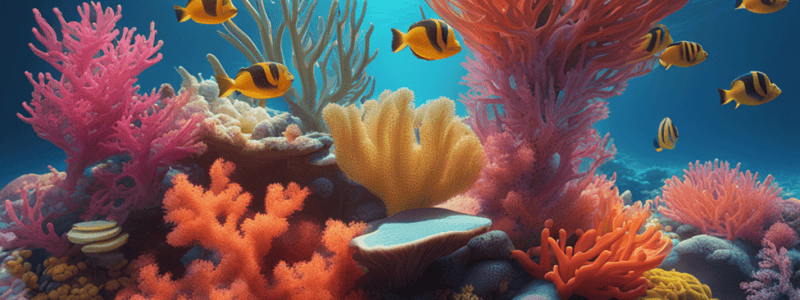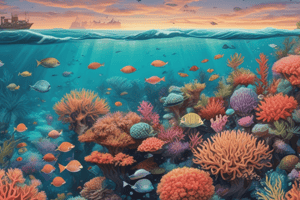Podcast
Questions and Answers
What is the primary cause of coral bleaching?
What is the primary cause of coral bleaching?
- Expulsion of symbiotic algae (correct)
- Excessive fishing activities
- Increased disease prevalence
- Pollution from oil spills
How does ocean acidification affect coral reefs?
How does ocean acidification affect coral reefs?
- Makes it easier for coral to build their skeletons
- Facilitates coral growth
- Creates a challenging environment for calcifying organisms (correct)
- Increases pH levels of seawater
How do coral reefs benefit coastal communities?
How do coral reefs benefit coastal communities?
- By increasing ocean acidification
- By causing marine biodiversity loss
- By providing a source of income and food (correct)
- By decreasing water pollution
Why are bleached corals more susceptible to disease and mortality?
Why are bleached corals more susceptible to disease and mortality?
In addition to coral bleaching and ocean acidification, what other factors contribute to coral reef degradation?
In addition to coral bleaching and ocean acidification, what other factors contribute to coral reef degradation?
What is a major factor contributing to the decline of coral reefs?
What is a major factor contributing to the decline of coral reefs?
How much of the world's coral reefs were estimated to have already been lost by 2018?
How much of the world's coral reefs were estimated to have already been lost by 2018?
What is a potential consequence of the loss of coral reefs on marine biodiversity?
What is a potential consequence of the loss of coral reefs on marine biodiversity?
Which statement accurately reflects the current situation regarding coral adaptation to climate change?
Which statement accurately reflects the current situation regarding coral adaptation to climate change?
How are governments, communities, and scientists urged to respond to protect coral reefs?
How are governments, communities, and scientists urged to respond to protect coral reefs?
Flashcards are hidden until you start studying
Study Notes
Climate Change's Impact on Corals: A Tale of Bleaching, Acidification, Degradation, and Adaptation
Coral reefs are the colorful underwater ecosystems that serve as home to an array of marine life, and they're also a vital source of food and income for coastal communities. However, these delicate structures are fighting a battle against global warming, and their future is looking bleak—or at least more pale due to the alarming phenomenon of coral bleaching.
Coral Bleaching
Coral bleaching occurs when the symbiotic algae called zooxanthellae that live within coral polyps are expelled or become inactive. This process is often triggered by elevated water temperatures, which cause the coral to turn white due to the absence of the colorful algae. Bleached corals are more susceptible to disease and mortality, and once they lose their symbiotic algae, they may not be able to recover.
Ocean Acidification
Another threat to coral reefs is ocean acidification, which is caused by seawater absorbing excess carbon dioxide from the atmosphere. This process lowers the pH of the ocean, making it harder for coral to build their skeletons and creating a more challenging environment for calcifying organisms like coral and plankton.
Coral Reef Degradation
Coral reefs are not only affected by the above processes, but also by a multitude of other factors. Pollution, overfishing, and habitat destruction, along with climate change, are compounding the problem, causing coral reefs to degrade at an alarming rate. A 2018 study estimated that 14% of the world's coral reefs had already been lost, while an additional 30% were considered to be in a state of severe decline.
Coral Adaptation
Some corals have started showing signs of adaptation to climate change, with certain species developing resistance to higher temperatures and ocean acidification. However, the rate of adaptation is not keeping up with the rate of change, and the overall picture for coral reefs remains grim. Coral reefs are not expected to recover on their own, and concerted efforts by governments, communities, and scientists are urgently needed to protect these delicate ecosystems.
Marine Biodiversity Loss
The health of coral reefs is closely linked to marine biodiversity. The loss of coral reefs will have cascading effects on the marine food web, threatening species such as fish, sea turtles, and marine mammals that rely on coral reefs for food, shelter, and reproduction. The decline of coral reefs could have serious consequences for coastal communities that depend on marine resources for their livelihoods.
In conclusion, coral reefs are facing a multifaceted crisis due to climate change, and the impact is already being felt. Coral bleaching, ocean acidification, and degradation are all contributing to the decline of coral reefs, and marine biodiversity is threatened as a result. However, there is still hope. Scientists and conservationists are working to find solutions to protect coral reefs and the diverse array of species that inhabit them. By raising awareness and taking action to mitigate climate change and reduce other stressors on coral reefs, we have a chance to save these vital ecosystems for future generations.
Studying That Suits You
Use AI to generate personalized quizzes and flashcards to suit your learning preferences.




